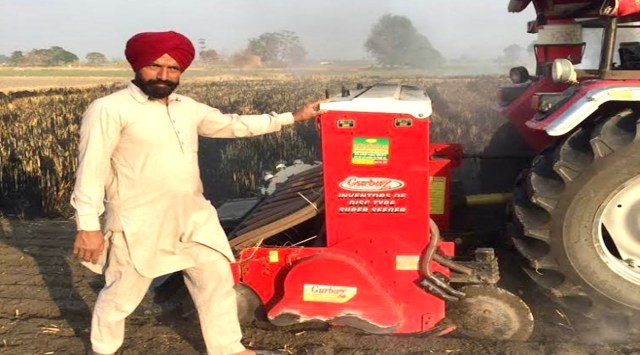In fields across Punjab, farmers crave a helping hand to cultivate a better future
Under the Extension programme – which experts call backbone of modern farming, farmers must be trained about improved agronomic practices for every cropping season and they must be provided with latest information related to agri-related government schemes.
 Farmer Darbaar Singh of Mansa with a machine in his field (Express photo)
Farmer Darbaar Singh of Mansa with a machine in his field (Express photo)“Agriculture Extension Services, what is that?”
Parampal Singh (33), a farmer for 15 years from Bathinda’s Teona village, has never heard of a programme that is a key deliverable for all agriculture departments across the country in order to enhance farmers’ income and improve crop yields.
“Can you explain what that is,” he asks, giving away the huge knowledge gap that exists between the policy makers’ desks and the farmland.
Under the Extension programme – which experts call backbone of modern farming, farmers must be trained about improved agronomic practices for every cropping season and they must be provided with latest information related to agri-related government schemes.
“I have never seen any officer visiting us and educating about the new techniques, schemes and providing any training,” says Parampal.
He adds: “I can use WhatsApp, Facebook and can get agri-related information from the department officials on these social media applications, but I am not getting any.”
Parampal, who owns 19 acres of land in Teona, has been growing wheat, paddy and cotton for years. Talking about this year’s pink bollworm attack on cotton, he said that he had grown narma on 5 out of his 19 acres and when the pest attack came, he and many other farmers like him ended up spraying excess pesticides to save their crops which was of no use.
“Agriculture experts could have told the farmers immediately that no spray would work, but farmers spent huge amount and then at last they came to know that uprooting plants was the only solution,” he said, adding that before sowing of any crop farmers should get information about the quality seed of that crop, its diseases, and prevention methods.
 Farmer Parampal Singh of Bathinda sitting in his field (Express photo)
Farmer Parampal Singh of Bathinda sitting in his field (Express photo)
“But farmers come to know about these things once the damage is done,” he rued.
Another farmer, Darbara Singh, said that in the name of training and education he had attended a farmer camp in his village which was organised around five years back in 2015-16 when white fly attack had damaged cotton crop in the entire cotton belt of Malwa region. “Most farmers of my village depend on the information about any new seeds and sprays after pest attacks and that too from seed companies and fertilisers, pesticide dealers in the area,” said Darbara Singh.
The farmer, in his 40s, hails from Moola Singhwala village in Mansa tehsil, and claimed that there was no agriculture development officer (ADO) in his village for the past around 5 years and now a new ADO had joined 3-4 months back.
“He has started getting in touch with me now to clear doubts,” he said.
He owns four acres of land, has been farming on 30 acres — 26 acres on lease — for the past over two decades.
Uneducated, but a progressive farmer, Darbara Singh has been growing paddy, and wheat crops on 29 acres of land and one acre he keeps for cotton.
“This rabi sowing season, I want to grow mustard oil seed crop on one acre for the first time to gain experience to increase the area under it from next season. But I have no knowledge about its sowing. I went to my district’s agricultural office twice from where I got the seed of sarson, but no one was there to educate me about its sowing, and other precautions for this crop. Now, I will contact our area ADO again to know about its sowing,” he said, adding that farmers do not have time to visit department offices again and again as they are busy during sowing season.
Recounting the trouble he has faced in getting a basic service like getting his soil health checked, he added: “I gave the sample of my soil twice in the district agriculture office but two years have passed and no result has so far been provided to me regarding the health of my soil.”
“In this kharif season, out of my 29 acres of my paddy fields I did not spray any pesticide on 15 acres till end of cropping cycle despite seeing some pests. However, I followed the same old practice of regular sprays on 14 acres paddy fields which 95 per cent of the paddy growers follow in the state starting sprays from 45-day-old crop till its ripening. The results of both the crops were the same,” said the farmer.
He argued that farmers must be told that appearance of any pest does not mean that “we should immediately make sprays because a small number of pests cannot harm any crop as they die themselves after a few days”.
Darbara Singh further says that he only learnt from experience that if pests appear at Economic Threshold Level (ETL) then they would not harm any crop, but majority farmers do not know such things.
Sansar Singh (70) from Sangrur’s Kanakwal village has been into farming for four decades, but he thinks little of efforts by the agri department, saying “there are few times when Kisan Melas are organised at village level, par sadde palle kuj ni painda (we don’t understand anything in these village fairs)”.
Village after village, farmers told The Indian Express that they needed training from agriculture department experts to handle their crops better.
Gurcharan Singh (50), a Class 12 pass farmer, said , “We would like to have formal training about the benefits of not burning stubble in the field, quality seed availability, about other subsidiary occupations like dairy farming, but we hardly see any agriculture officer in our area to guide us.”
“Only educated farmers are getting information on phone, WhatsApp, Facebook, but 80 per cent farmers in our village are uneducated,” said Sansar Singh.
Jalandhar-based farmer Talwinder Singh, who does farming on 60 acres, accused agri officials of undertaking perfunctory visits to fields of their “favourite farmers” to show their field work in government records.
Farmer Devinder Singh from Tarn Taran ‘s Gandiwind block said that there has hardly been an ADO posted in their block for years now who is capable enough to guide them about good farm practices.
Some progressive farmers, however, said that they do get important information from the department officials before sowing any crop but that too after “chasing them”.
“Under agriculture extension, which is the backbone of our agriculture, formal practical training and education in farming and allied fields is necessary for introduction of latest methods to enhance farmer’s income by curtailing unnecessary inputs cost, and to increase yield by adopting precise farming techniques. It is also essential to help farmers adopt cropping patterns which are suitable for their soil type. There is an urgent need to strengthen extension services to bring farmers out of agrarian crisis,” said Varinderjit Bhandhari, former Deputy Director, Punjab Agriculture Department, who retired recently but still works for the welfare of farmers.
Doing our bit, says agri department
The Punjab Agriculture Department, however, says that it is doing its bit.
According to the department, there were around 10.93 lakh operational land holdings in Punjab till some years back, and around 18.50 lakh famers (after further division of the farm land among family members).
Agricultural department officials said that about 3 lakh farmers are imparted training every year during rabi and kharif season camps. The camps are organised at district, block and village level. Giving out numbers, the department said that around 344 such camps are organised at district, block level and 5,000 at village level every year.
The department also said that to reach out to farmers, social media and other innovative methods are used which include forming WhatsApp groups of the farmers, telephonic calls & messages, and announcements in the villages through local religious places.
Mobile apps like i-khet machine, kisan suvidha app, m-kisan, farmers’ portal, cotton surveillance app and departmental website http://www.agri.punjab.gov.in are also there, said a senior officer in the department. He added that farmers are also advised to contact the local agriculture office for information.








